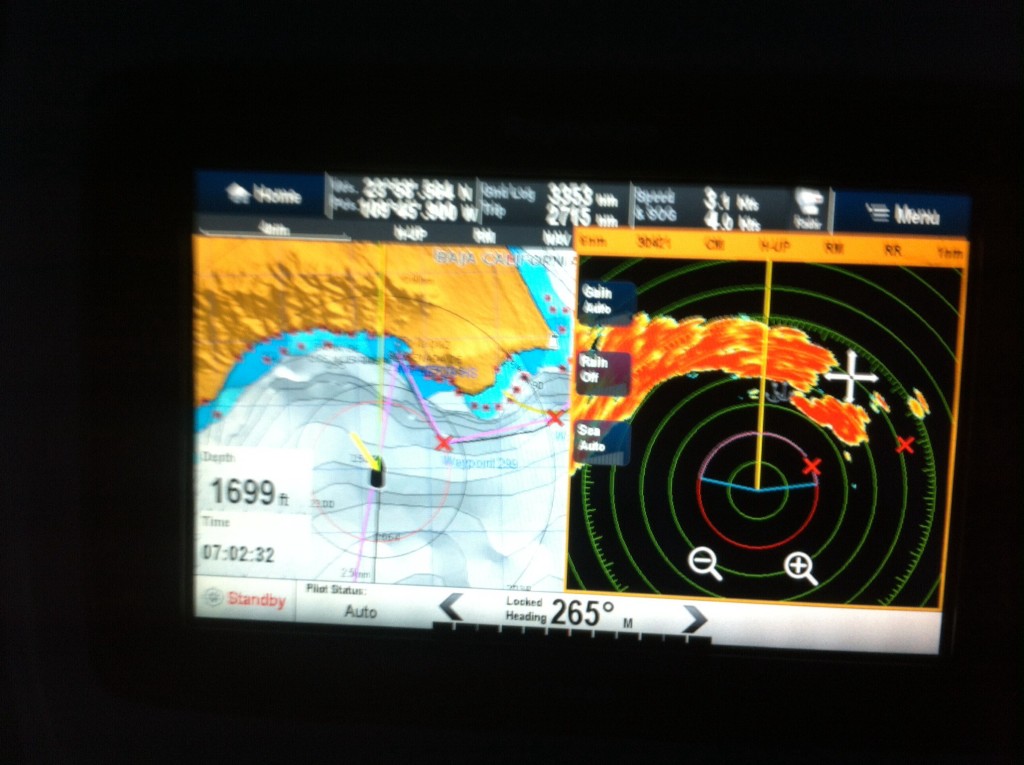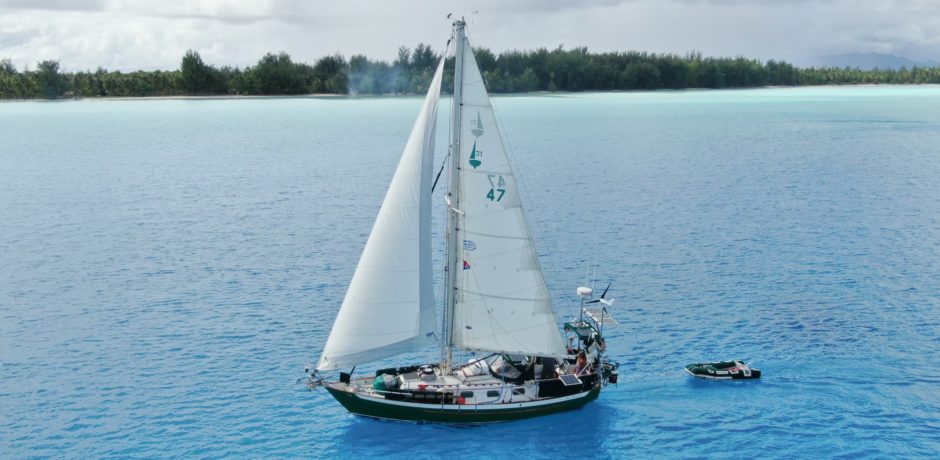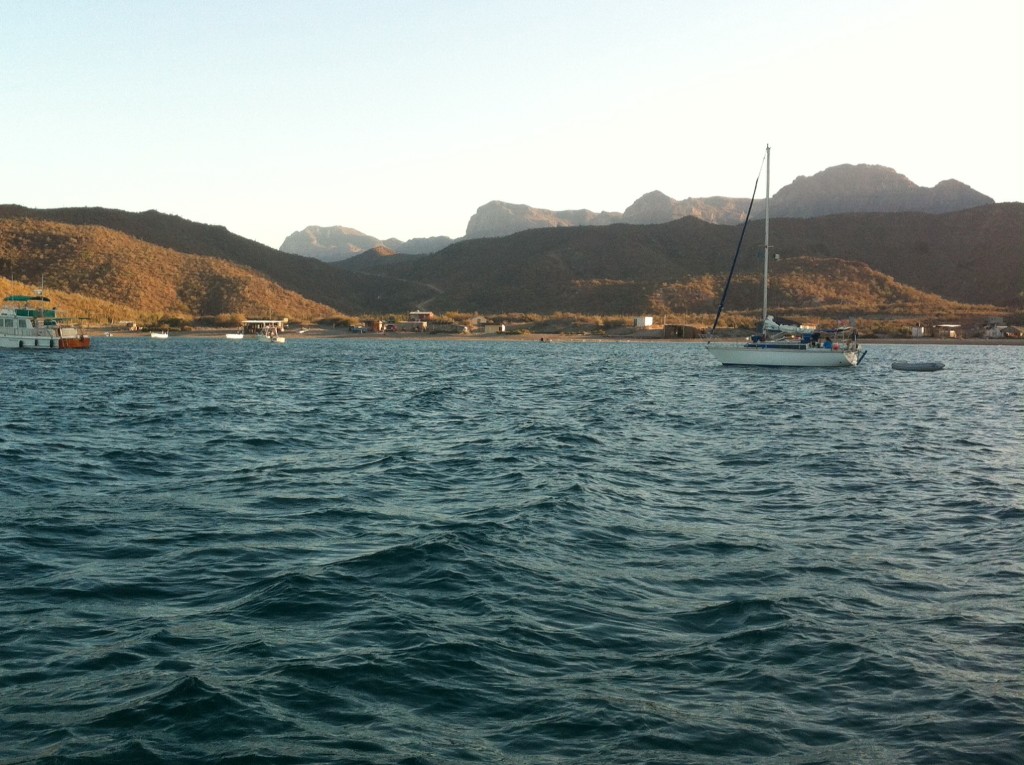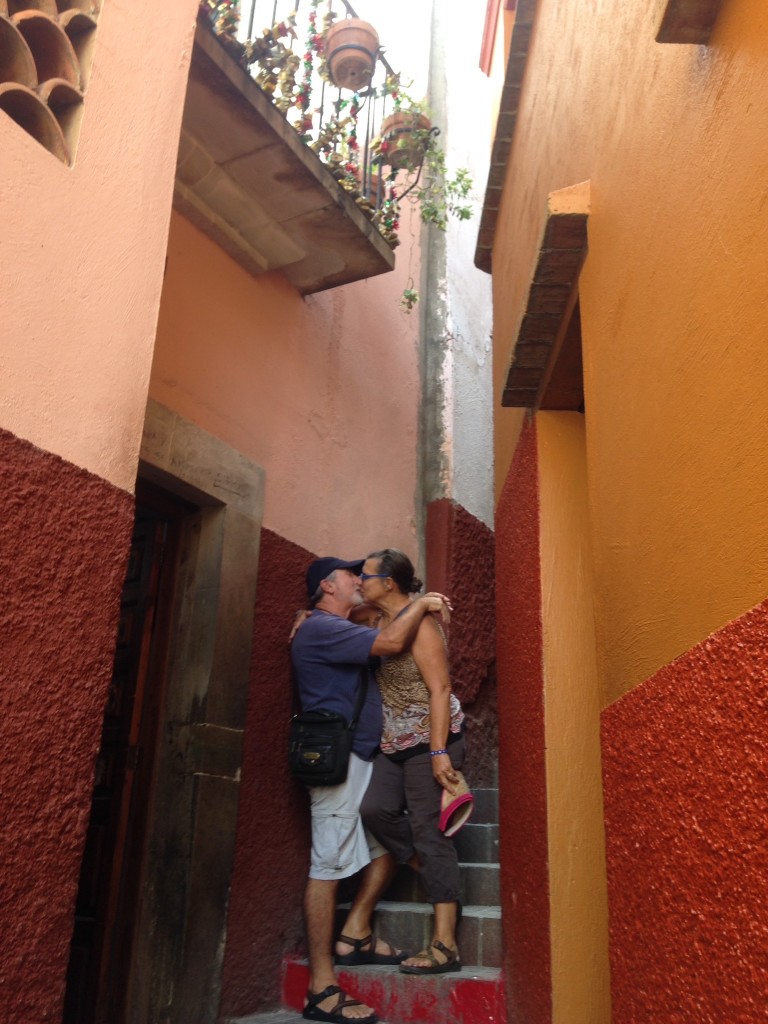Rick documented almost every day of our three week tour of the Sea of Cortez, to a level of detail I didn’t need to duplicate. Instead I just wrote when inspired, about some little aspect or other of our trip. Here are a few of my musings.
SAN EVARISTO
Have you ever been so sad to the point of tears, at the happiness you feel at the moment, knowing it will not last? Have you ever tried desperately to etch indelibly into your memory, everything you are feeling in your heart, smelling, seeing, touching, tasting and hearing, because the moment is fleeting and may never come again, and you don’t want to forget it? Have you ever had a moment that you step out of yourself to realize this is one of those moments, when all you have left is memories, that will stand out as one of the best?
Last night I had one of those moments. Rick was making me one of his scrumptious dinners from some shrimp we bought on the beach so fresh that the fisherman was tearing the heads off as he weighed them. Rodrigo Rojas, one of our favorite contemporary Spanish ballad singers, was playing on the stereo. I sat on a cushion on the bow of Cool Change, facing the cool evening offshore breeze that made every inch of my skin feel refreshed and alive. The night sky was just darkening enough to begin to see a scattering of stars. The light marking San Everisto point, which framed the small bay where we were anchored, flashed once per second for three seconds and then was quiet for three seconds, as if to allow me to take in the night view before the light diverted my eyes again. The Sierra of the Giant mountain range sheltered us from the south, north and west, and San Jose island across the channel had its own mountains to protect us from the east. Wind waves rocked Cool Change like a baby in the arms of her mother in a rocking chair. The last of the birds cat-called each other on their way across the sky to their evening resting place. The soft glow of incandescent lights inside the few other boats anchored in the bay told me everyone was tucked in for the night. And then I heard the deep long breath of a dolphin somewhere close to me on port, repeating itself to confirm it was still there, keeping me company. And off in the distance I heard the slap of a manta ray, hitting its wings to the water after a jump into the air.
In a few short weeks I will be driving a car, parking in parking lots, finding my way up elevators and down sterile halls of medical centers in hopes of finding a treatment to cure the chronic pain in my back, hip and thigh that is increasingly disabling me from walking and even sleeping. But for this one moment, I had no pain. I found myself totally absorbed in the beauty, quiet, peace and happiness that comes from being with the person of your dreams in the place of your dreams, and I didn’t want to ever let go.
NOTES ON CURRENTS
This morning as we motored out of Agua Verde anchorage heading south, I was being super vigilant because our course had to pass closely along a route set by our guidebook to safely navigate through a rocky passage between the peninsula and a nearby small island. The distance between the visible obstacles was about a mile and a half but only a narrow portion of that was allegedly deep enough to pass through. I worried as the depth indicator showed decreasing depth, and my anxiety heightened as we approached breaking wavetops scattered in a row off my starboard bow. Against all logic, since I was retracing our earlier track, I feared the breaking waves meant a shallow reef ahead, and I changed course to the left. But then I saw breaking wavetops there too, not just in a row, but all around me. All of a sudden, as if crossing an invisible line, our speed over ground decreased by about a knot, and the speed through the water remained the same as it had been, making speed through the water greater than speed over ground. I realized that all those breaking wavetops were not indicating shallow water; instead, they were the result of a strong current opposing the wind and coming against me, slowing my speed and making the water a boiling caldron of confused seas. For about 20 minutes we rolled around all over the place and it was hard to even stand at the helm without strain on my legs. Then, as quickly as it had come, as soon as we got through the narrow passage, it was gone. Our speed over ground increased a knot and exceeded our speed through the water once again.
So this is the way current works, in case you are new to the subject or just never thought about it much before. The speed over ground and the speed through the water should be approximately the same if there is no current. But if there is a current going in the same direction you are, it increases your speed over ground but not your speed through the water. Current is like a moving walkway. How fast you get to your destination on the moving walkway equals the speed you are walking plus the speed the moving walkway is moving. That totals speed over ground. But speed through the water is just your walking speed without the speed of the moving walkway. As you might imagine, having a current against you is like walking on a moving walkway in the wrong direction. The only headway you make is if you can walk faster than the walkway is moving you in the opposite direction. On top of it, the current opposing the wind causes the waves resulting from both to collide with each other and make bumpy seas. That is why, for example, you don’t want to leave the Golden Gate in San Francisco under an outgoing tide in the afternoon when the wind is ripping in through the Gate at the same time. The seas can become huge.

Here is an example of speed versus SOG (speed over ground) differing. Sorry it is a little blurry. Speed is 3.1 and SOG is 4.0. That means we have .9 current carrying us forward beyond the 3.1 knots we are propelling ourselves.
When we upgraded our electronics, we had to decide if we wanted the added cost and little bump on our hull to carry a mini-paddle wheel to measure speed through the water. Otherwise we would have relied on GPS to give us only speed over ground. I am glad we settled on both. The more information I have available to help me interpret what is happening on the seas, the better! That same little paddle wheel gives the electronics computer the information to calculate true wind speed versus apparent wind speed, which helps us to determine whether we have enough wind to bother to deploy the sails, or whether it is time to reef, factoring in whether we are on an upwind or downwind tack. There are certainly other tricks that old salts use to give then the same information without electronics, but I for one like having the data. So, all is good!
IT TAKES TWO
Rick was born with a natural ability to fix things, honed over 60 years of developing those skills, like being an airplane mechanic, installing alarm systems, studying electronics, running his own home improvement business, building his own home, specializing in high energy radio technology, and managing electronic communication systems. It is a good thing we are team members and not competitors because I wouldn’t fair well in a contest of who is more mechanically inclined. I, on the other hand, have better skills with my head than my hands, better in the conceptual than the practical sphere. For example, I got marked down in college chemistry lab because my yields were too low until I teamed up with a lab partner who had high yields but low marks for his written analysis – not methodical enough – so together as a team we both got high grades; he did the experiment and I wrote up the results. My undergraduate degree in philosophy honed my skills in analyzing, complimented by a career mostly as a a management/financial analyst. I think in systems, how things fit together; just don’t ask me to fit them together!
So I am super lucky that the other half of my team in life, and in running this sailboat, is so incredibly talented in fixing things, because I am no better than average in such things. But we have discovered on this trip that having all that knowledge has its disadvantages. For example, when something goes wrong, Rick has such a large database stored in that head of his that sometimes he starts thinking about the most complicated causes of problems first, instead of the simplest, most obvious cause. Why is there standing water in the sinks? Why is the iPad not charging? Why is the SSB radio not tuning into the broadcast? Once problems like these are brought to my attention, if I don’t get engaged in thinking about the solution right away or if I assume Rick has already considered the obvious, sometimes hours can go by with him thinking about all the possible complicated causes of such problems without solving them. But then I step in and ask if the drain thru-valve is open or closed, or if the breaker is on or off, or if the radio is tuned to upper or lower sideband, and voila! problem solved. Rick says I am a good problem-solver. I just think it goes to show you that sometimes it takes two people with different but complementary skills to run a boat.
Because of my current disabled status of an unresolved hip/leg/back problem, I guess I am also a bit defensive about carrying my share of the load on the boat. I have had to totally abdicate my role as an equal partner in the heavy lifting component of sailing Cool Change. That was a hard pill to swallow after having worked so hard to achieve equal knowledge and status as co-captain in sailing our ship. But until I get all my parts working again, Rick has had to take on most of the forward deck work and anything that requires strength, stamina and most importantly, balance. For example, he has to manhandle a 35 pound anchor twice a day from the bow of our boat over the pulpit into the water and back again because our favorite anchor doesn’t fit on our bowsprit. While meanwhile, I can’t stand on my left leg for more than a minute or two without it aching me to death or just giving way. Rick has happily taken on all this extra work, with the attitude that he will do whatever it takes to keep us on the water together, the alternative being a waiting game in the States in medical centers and hospitals. And I am so incredibly grateful. I just had to get over myself and admit that sometimes I just can’t do it all, and that it is okay to give up some of my power by letting someone else help, or even take over.
And what I am beginning to learn from all of this is that even if Rick has more mechanical ability than I do and now even has more hands on experience in the heavy-lifting activities of sailing than I do, we still both need each other to run this boat. While he is at the bow with the anchor, I am at the helm steering the boat and making sure the anchor gets dropped in the right place, setting the anchor alarm and measuring whether the anchor is set. When he is up at the mast raising the mainsail, I am at the helm trailing the halyard, handling the reef lines and keeping us into the wind. When I am docking, he is tying off the docklines and vice versa. While he likes to plot our position on a chart, I do most of the navigation planning and chartplotter waypoint and course programming. We both cook, so neither of us feels overburdened by it. He cleans the outside of the boat and I clean the inside. We each do our share, and he needs me as much as I need him even though right now he takes up my slack when I am struggling with pain. And meanwhile I do everything I can to help the boat run smoothly and he does too.
I am not saying single-handling is impossible. If he had to, like if I were seriously injured or something, Rick could do it right now. And I dare say I would overcome my leg pain and do it myself right now if I had to also, even though my odds would be better if all my parts were working. Plenty of people, mostly older guys, can be found in Mexican marinas who have no partner and have soloed, either by choice or circumstance. I am sure there is a certain satisfaction to doing it all yourself, but not all of us are Joshua Slocum’s, sailing into every port and dousing the sails while tying off to the dock in a perfectly timed dance with the wind. Most of us need help, or at least find it to be more fun sailing when we have help. I know Rick and I do. Not only in sailing, but in life. We are better together.


